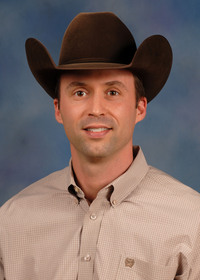Information Possibly Outdated
The information presented on this page was originally released on December 11, 2008. It may not be outdated, but please search our site for more current information. If you plan to quote or reference this information in a publication, please check with the Extension specialist or author before proceeding.
Riders develop skills with special therapy
MISSISSIPPI STATE -- Wheelchairs and crutches are not common sights at most horseback riding classes, and laughter is not always heard at physical therapy sessions, but all of these can be found at the Mississippi Horse Park.
The therapeutic riding program available at the horse park near Starkville offers children and adults with physical challenges a chance to develop skills atop a living, breathing animal.
The program is accredited through the North American Riding for the Handicapped Association. It runs two six- to eight-week-long sessions annually: one in fall and one in spring. During sessions, riders meet each Tuesday morning.
“There are two arms of our program: therapeutic riding and hippotherapy,” said Mary Riley, 4-H therapeutic riding coordinator with M.S.U.'s Extension Service. “One of the big differences between the two types of riding is that hippotherapy is conducted by a medical professional – an occupational, physical or speech therapist – and a certified therapeutic riding instructor, who is responsible for the horse, equipment and volunteers. Therapeutic riding does not require a medical professional.”
Hippotherapy riders meet in the earlier time slots, one at a time. Two classes of therapeutic riders later in the day, with a maximum of three riders per class.
Both therapeutic riders and hippotherapy riders stay on their horses for about 45 minutes. They are surrounded by a group of volunteer “side walkers” who help them on and off the saddle and work to prevent injury.
Riley said her group develops an individual plan for riders based on their own goals and the goals their therapists have set for them. The goal is to reinforce the work they are doing in the clinic.
“A horse's pelvis is identical to a human's pelvis but offset by 90 degrees, so it triggers the same muscular responses in a rider that a person gets by walking,” Riley said. “That stimulation helps riders develop better balance, posture and breath control.”
Riley said the sessions are not only about riding. Riders are asked to respond to questions and verbal commands while on the horse, and all that stimulation adds up to a major physical and mental challenge.
“We have a lot of sensory integration equipment in the clinic, but being on the horse is exponentially better,” said Linda Maiers, the Oktibbeha County Hospital occupational therapist who provided hippotherapy during the most recent session.
“The horse engages the rider's vestibular system, which runs throughout the body and affects functions like alertness, balance and digestion,” Maiers said. “I definitely feel that my patients progress faster with hippotherapy than with therapy in the clinic, and the improvements really seem to stick with them.”
While the program is effective, it's not as cost-effective as clinical therapy.
“We do charge for the hippotherapy, but because of the extra time we spend driving and waiting, Oktibbeha County Hospital doesn't really make any money from it,” she said. “The hospital allows us to work with the program as a service to the community.”
Paige Linley of Starkville is one rider who has benefited from that service. The 3-year-old daughter of Patrick and Janey Linley, Paige was born with brain bleeds that resulted in hydrocephaly, which caused cerebral palsy and seizures. She has been involved in the program for the past two sessions.
“I had to talk my family into it when I first heard about the program,” said Janey Linley. “But two or three weeks into the session last year, she was like a totally different child.
“She was able to walk without falling, and her speech improved because her core was stronger,” Linley said. “Before, she was falling a lot and getting upset about it, but now when she falls, she knows how to catch herself.”
For the Linleys, Paige's hippotherapy has become a family affair.
“It has brought our family together because everyone wants to talk about it and go watch her,” Linley said. “Her twin sister, Megan, is so proud of her and cheers her on.”
Riley said the program's success is the result of many people working together.
“So many people come together to make this happen, from the riders and their families to the volunteers to the therapists,” Riley said. “But it's worth the work because we see firsthand the self-confidence and sense of accomplishment riders get from the program.”


